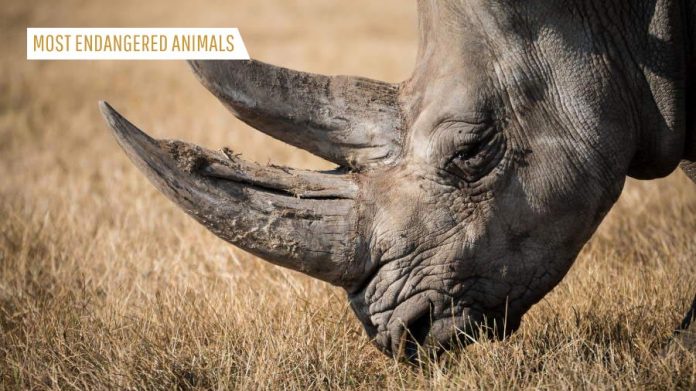Earth is home to over 30 million animal species. However, several species are at risk of extinction due to human intervention for consumption or entertainment. The animal in danger of extinction is found all over the world. For some animals, time on planet Earth is running out. Humans are the most significant danger to the survival of endangered animals, with poaching, habitat destruction, and the effects of climate change causing many of the problems. Read on to learn about some of the most beautiful creatures in Need of our help, protection, and conservation.
Endangered animals are very likely to become extinct shortly, either in a particular political jurisdiction or worldwide. There are many reasons for these animals’ dissolution: their fur, the oil they produce, or their food source. There are many different types of endangered species, and here we will take a look at some of the most threatened species out there.
Which species is the most critically threatened or endangered?
With around ten remaining individuals of its species, the Vaquita is the most threatened species on the planet.
Which animal is endangered and why?
The Javanese rhino is the closest to extinction, with 46-66 individuals remaining, all found in Indonesia’s Ujung Kulon National Park.
Where do the most endangered animals live?
Asian and South America have the highest numbers of endangered animals, India, Brazil, and Australia. Species are coming under threat from many sources, from hunting and pollution to climate change and habitat loss.
10. Amur Leopard
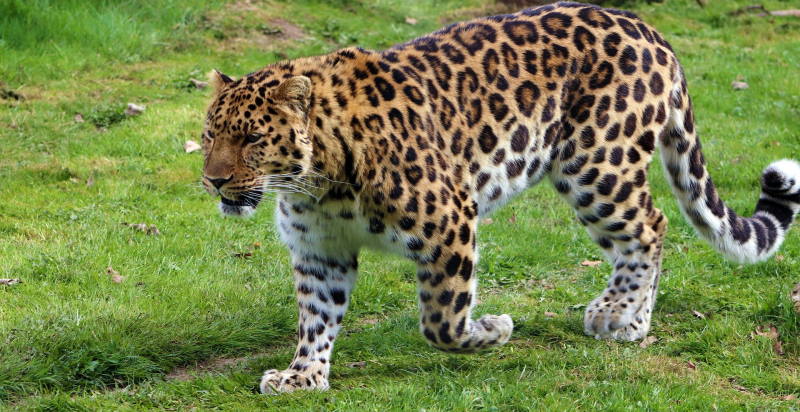
The Amur leopard is solitary, with agile legs. It carries and hides unfinished fleshes so that other predators do not capture them. This incredible animal has been reported to jump over 19 feet horizontally and up to 10 feet vertically. Amur Leopard stands on the tenth rank on your list and holding a population of around 84 individuals. They live for 10 to 15 years and in captivity for up to 20 years. The Amur leopard is well known as the Far Eastern leopard, the Manchurian leopard, or the Korean leopard. The Amur leopard can run at a speed of 37 miles per hour.
| Status: | Critically Endangered |
| Population: | More than 84 individuals |
| Scientific Name: | Pantherapardus Orientalis |
| Height: | 6-7 feet |
| Weight: | 70 -105 pounds |
| Length: | 6-7 feet |
| Habitats: | Temperate, Broadleaf, and Mixed Forests |
| Geography: | Amur-Heilong |
9. Black Rhino
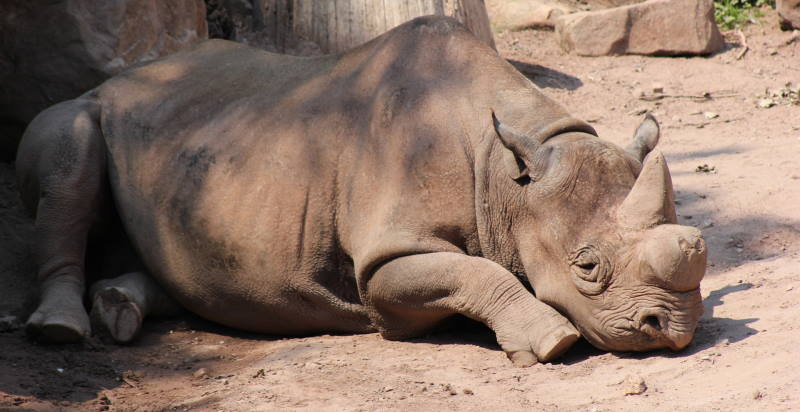
The black rhino population declined fastly in the 20th century due to European hunters and settlers. Black rhinos are mostly smaller as compared to the two African rhino species. It is what distinguishes them from the white rhinos, which have a square lip. Black Rhino stands on the ninth rank on your list and holding a population of around 5,600 individuals. Black rhinos are browsers instead of willows, and their pointy lip helps them feed on leaves on bushes and trees. They have two horns and rarely a third, small rear horn. In this case, poaching and black market trade in rhinoceros horn, Wildlife crime continues to plague the species and threaten its recovery.
| Status: | Critically Endangered |
| Population: | Around 5,600 |
| Scientific Name: | Dicerosbicornis |
| Height: | 5.2 feet |
| Weight: | 1,760 -3,080 pounds |
| Length: | 9.8–12.3 feet |
| Habitats: | Semi-Desert Savannah, Woodlands, Forests, Wetlands |
| Geography: | Namibia, Coastal East Africa |
8. Bornean Orangutan
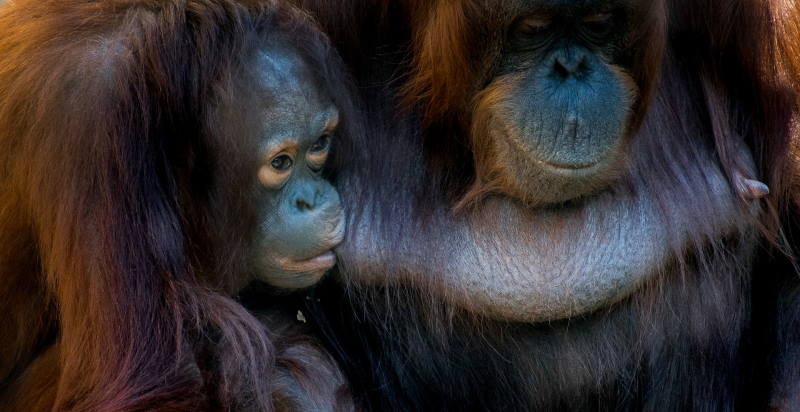
The Bornean orangutan (Pongopygmaeus) is now critically endangered. Populations have declined sharply because of habitat destruction and illegal hunting, and the IUCN told the island of Borneo last week, where its population has declined by 60 percent since 1950. Orangutans stand on the eighth rank on your list and holding a population of around 104,700 individuals. They have a characteristic ape-like shape and grasping hands and feet, along with shaggy reddish fur. Their powerful arms are longer and more robust than their legs and can reach two meters in length, sufficiently long to touch their ankles when standing.
| Status: | Critically Endangered |
| Population: | About 104,700 |
| Scientific Name: | Pongopygmaeus |
| Height: | 3.3 – 4.6 feet |
| Weight: | 66–220 pounds |
| Length: | 6.5-8.0 feet |
| Habitats: | Lowland rainforests and tropical, swamp, and mountain forests |
| Geography: | Borneo and Sumatra |
7. Cross River Gorilla
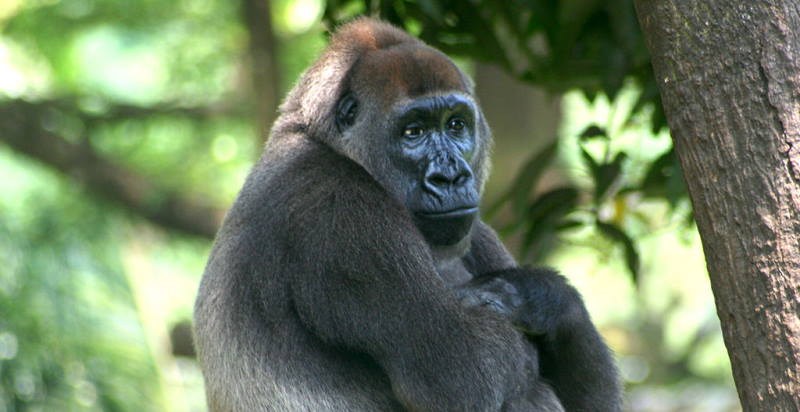
Cross River Gorillas live in an area where many people live, invading the gorilla territory – clearing forests for wood, creating agriculture and livestock fields. Deforestation occurs in the forests, and some of these gorillas’ loss adversely affects such a small population from securing the forests they live in. Cross River Gorilla stands on the seventh rank on your list and holding a population of around 300 individuals. WWF and its partners have worked with Cameroon and Nigeria’s governments to create a sanctuary for the Cross River Gorilla, which straddles the border between these two nations.
| Status: | Critically Endangered |
| Population: | 200 – 300 |
| Scientific Name: | 4 – 5 ½ feet when standing on two feet |
| Height: | 6-7 feet |
| Weight: | up to 440 pounds |
| Length: | 4.7 to 5.5 feet |
| Habitats: | Lowland montane forests and rainforests of Cameroon and Nigeria |
| Geography: | Congo Basin |
6. Javan Rhino
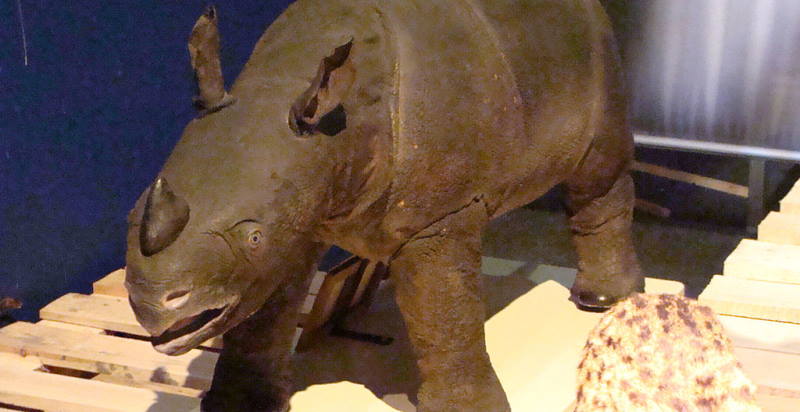
Javan rhinos are the most threatened and endangered of the five rhino species, with about 60 individuals living only in the Ujung Kulon National Park in Java, Indonesia. Javanese rhinos once lived in northeast India and Southeast Asia. Vietnam’s last Javanese rhinoceros were poached in 2010. Their skin has several loose folds that give it the appearance of armor. Javan rhinos stand in the sixth rank on your list and holding a population of around 60 individuals.
This species is of dark gray and has a single horn up to 10 inches. The Javanese rhinoceros look very similar to the closely related larger-horn rhinoceros but have a much smaller head and less visible skin folds.
| Status: | Critically Endangered |
| Population: | Around 60 |
| Scientific Name: | Rhinoceros sondaicus |
| Height: | 4.6–5.8 feet |
| Weight: | 1,984 – 5,071 pounds |
| Length: | 10–10.5 feet |
| Habitats: | Tropical forests |
| Geography: | Ujung Kulon National Park |
5. Sumatran Elephant
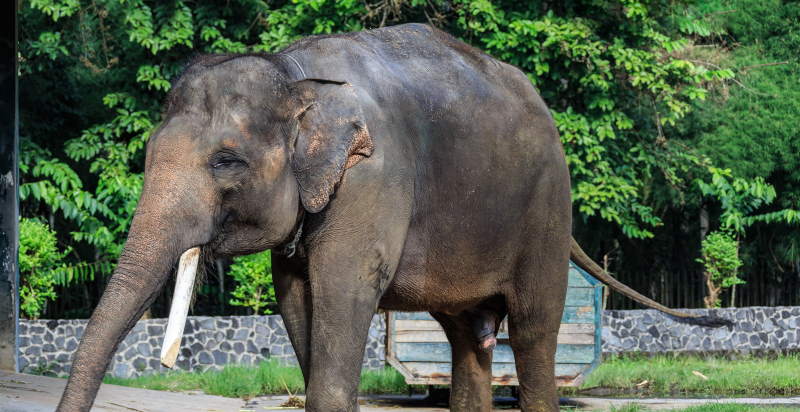
Sumatran elephants feed on various plants and deposit seeds wherever they go, contributing to a healthy forest ecosystem. They also share their lush forest habitat with several other endangered species, such as the Sumatran rhino, tiger and orangutan, and many others. Sumatran Elephant stands on the fifth rank on your list and holding a population of around 2,800 individuals.
They attack crops, trample homes, and sometimes even injure or kill people. Those affected sometimes retaliate and poison or shoot elephants.
| Status: | Critically Endangered |
| Population: | 2,400 – 2,800 |
| Scientific Name: | Elephasmaximussumatranus |
| Height: | 5-9 feet at the shoulder |
| Weight: | approximately 5 tons |
| Length: | up to 20 feet |
| Habitats: | Broadleaf moist tropical forests |
| Geography: | Borneo and Sumatra |
4. Yangtze Finless Porpoise
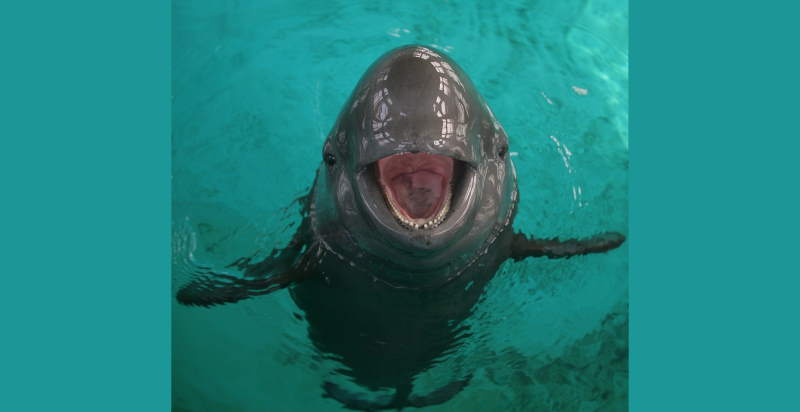
Yangtze River in Asia used to be one of only two rivers in the world that was home to two other species of dolphins: The Baiji Dolphin and the Yangtze Finless Porpoise. However, in 2006 the Baiji dolphin was stated functionally extinct. Yangtze Finless Porpoise stands on the fourth rank on your list and holding a population of around 1,800 individuals.
The entire species of dolphin had been wiped out of the planet due to human activity. The Yangtze finless porpoise is known for her mischievous smile and has an intelligence level comparable to that of a gorilla.
| Status: | Critically Endangered |
| Population: | 1000-1800 |
| Scientific Name: | Neophocaena Asia Orientalis ssp. Asiaeorientalis |
| Height: | 8 feet |
| Weight: | 310 pound |
| Length: | 6.2 feet |
| Habitats: | Lakes & Rivers |
| Geography: | Yangtze |
3. Sunda Tigers
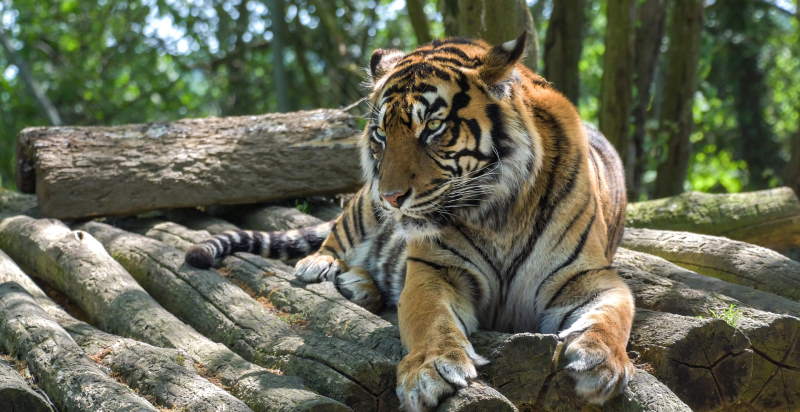
Their heavy black stripes distinguish them on their orange coats. The last of the Sunda Islands tigers, estimated to number less than 400, cling to survive in the remaining patches of forest on Sumatra’s island. Rampant poaching means this noble creature could end up extinct like its Javanese and Balinese counterparts. Sunda Tigers stands on the third rank on your list and holding a population of around less than 400 individuals. Hence, they are rapidly losing their habitat and prey, and poaching is an ever-present threat.
| Status: | Critically Endangered |
| Population: | Less than 400 |
| Scientific Name: | Pantheratigrissondaica |
| Height: | 8 feet |
| Weight: | 165–308 pounds |
| Length: | 6-9 feet |
| Habitats: | Tropical broadleaf evergreen forests, freshwater swamp forests, and peat swamps |
| Geography: | the Sunda Islands in Indonesia |
2. Saola
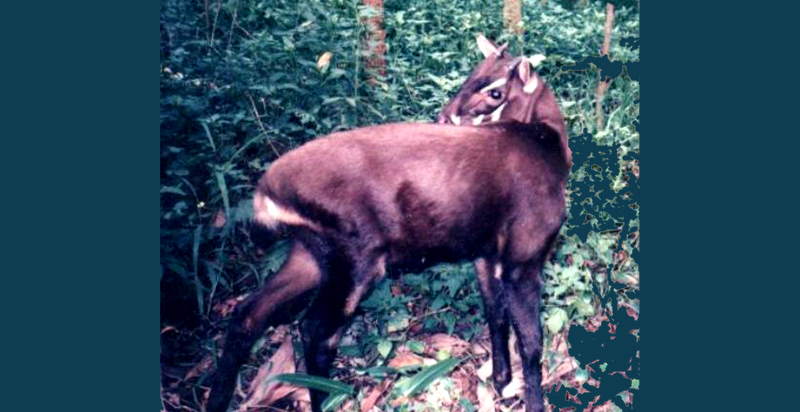
Saola (pronounced: sow-la) are recognized by their two parallel horns with sharp ends, which can reach 50 centimeters in length and are found in both males and females, which means “spindle horns” Vietnamese. Saola stands on the second rank on your list and holding a population of around 750 individuals. They are also the cousins of cattle but resemble an antelope.
| Status: | Critically Endangered |
| Population: | 750 |
| Scientific Name: | Pseudoryxnghetinhensis |
| Height: | Average 33 in. at the shoulder |
| Weight: | 176 to 220 lbs |
| Length: | 4.9 feet |
| Habitats: | Evergreen forests with some or no dry season |
| Geography: | Greater Mekong |
1. Vaquita
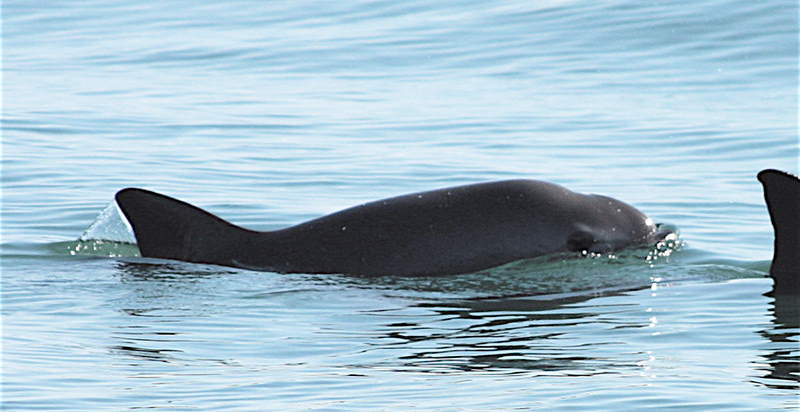
The Vaquita is the most endangered species, with only about ten remainings. The species will go extinct without a total ban on gillnets throughout their habitat. As a whole, the rapid decline of the Vaquita in Mexico is exemplified, with about ten individuals remaining. The population has drastically decreased in recent years. That’s why Vaquita stands on the first rank on your list and holding a population of around ten individuals. They have a substantial dark ring around the eyes and dark spots on the lips that form a thin string from the mouth to the pectoral fins. Its upper part, the dorsal surface, is dark gray, its sides are pale gray, and its lower part, the ventral surface, is white with long, light gray markings.
| Status: | Critically Endangered |
| Population: | About 10 |
| Scientific Name: | Phocoena sinus |
| Height: | Up to 5 feet |
| Weight: | Up to 120 pounds |
| Length: | 4.7 feet |
| Habitats: | Marine |
| Geography: | Gulf of California |
Conclusion:
There are several methods you can help to protect these animals. One of the best ways is to protect the Earth from using excess palm oil, use fewer plastics, protect wildlife habitat by stopping illegal poaching, use less water, and volunteer at a wildlife rehabilitation center near you. If you want to grasp more about what you can do for these endangered animals, visit the World Wildlife Fund for more information.
